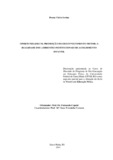| dc.creator | Lesina, Bruna Vieira | |
| dc.date.accessioned | 2021-11-22T12:20:29Z | |
| dc.date.available | 2021-11-22T12:20:29Z | |
| dc.date.issued | 2019-08-19 | |
| dc.identifier.uri | http://repositorio.ufsm.br/handle/1/22902 | |
| dc.description.abstract | This study aims to understand the context of childcare institutions as promoters of motor development for institutionalized children. Thus, two articles were written on the subject. The first was a narrative review to unravel the motor outcomes of institutionalized children and adolescents. The search was performed in three databases, Pubmed, Web of Science and Embase and articles were included in three foreign languages (Portuguese, Spanish and English). In total, 3379 references were found, after applying the exclusion criteria, 21 articles were included in the synthesis. It is concluded that there is a lack in the literature about the motor development of institutionalized children and adolescents. Although they do not have many studies, most studies have pointed out risks and motor delays in institutionalized children and adolescents. The second article assessed the environmental opportunities of 16 host institutions through the Affordances in the Home Environment for Motor Devolopment Questionnaire 18-42 months (AHEMD-2), the knowledge of 25 social educators on child development through the Knowledge of Infant Development questionnaire. Inventory (KIDI), and the motor development of 28 children aged 18 months to 42 months living in institutions through the Peabody Developmental Motor Scales - Second Edition (PDMS-2) instrument. A field diary was also made to better understand the context of host institutions. The results show that host institutions promote very good environmental opportunities for indoor and outdoor physical spaces, and very poor opportunities for equipment materials that stimulate the fine and gross motor skills of foster children, as well as professionals with a reasonable knowledge of child development. The children received present risks of concern due to their low level of motor development. It follows that childcare institutions should be better prepared to receive children who for various reasons have been separated from their biological parents and need favorable and appropriate conditions to avoid the risks of child development and to enhance their capacities for motor development. | eng |
| dc.language | por | por |
| dc.publisher | Universidade Federal de Santa Maria | por |
| dc.rights | Attribution-NonCommercial-NoDerivatives 4.0 International | * |
| dc.rights.uri | http://creativecommons.org/licenses/by-nc-nd/4.0/ | * |
| dc.subject | Desenvolvimento motor | por |
| dc.subject | Instituições de acolhimento | por |
| dc.subject | Criança institucionalizada | por |
| dc.subject | Motor development | eng |
| dc.subject | Institutions care | eng |
| dc.subject | Institutionalized child | eng |
| dc.title | Oportunidades na promoção do desenvolvimento motor: a realidade dos ambientes institucionais de acolhimento infantil | por |
| dc.type | Dissertação | por |
| dc.description.resumo | O presente estudo tem como objetivo compreender o contexto das instituições de acolhimento infantil como promotoras do desenvolvimento motor para as crianças institucionalizadas. Desta forma, foi elaborado dois artigos sobre o tema. O primeiro foi feito uma revisão narrativa a fim de desvendar os desfechos motores de crianças e adolescentes institucionalizados. A busca foi realizada em três bases de dados, Pubmed, Web of Science e Embase e foram incluídos artigos em três línguas estrangeiras (português, espanhol e inglês). Ao total, foram encontradas 3379 referências, após aplicar os critérios de exclusão, foram incluídos 21 artigos na síntese. Conclui-se que há uma carência na literatura sobre o desenvolvimento motor de crianças e adolescentes institucionalizados. Embora ainda não tenham muitos estudos, a maioria dos estudos apontaram riscos e atrasos motores nas crianças e adolescentes institucionalizados. O segundo artigo avaliou as oportunidades ambientais de 16 instituições de acolhimento através do questionário Affordances in the Home Environment for Motor Devolopment 18-42 months (AHEMD-2), o conhecimento de 25 educadores sociais sobre o desenvolvimento infantil através do questionário Knowledge of Infant Development Inventory (KIDI), e o desenvolvimento motor de 28 crianças entre 18 meses a 42 meses que viviam nas instituições através do instrumento Peabody Developmental Motor Scales – Second Edition (PDMS-2). Também foi feito um diário de campo a fim de compreender melhor o contexto das instituições de acolhimento. Os resultados revelam que as instituições de acolhimento promovem oportunidades ambientais muito boas quanto aos espaços físicos internos e externos e oportunidades muito fracas quanto a materiais equipamentos que estimulam a motricidade fina e grossa das crianças acolhidas, bem como, profissionais com um razoável conhecimento sobre desenvolvimento infantil. As crianças acolhidas apresentam riscos preocupantes pelo seu baixo nível de desenvolvimento motor. Conclui-se que as instituições de acolhimento devem estar mais bem preparadas para receber as crianças que por diversos motivos foram separadas dos pais biológicos e necessitam de condições favoráveis e adequadas para evitar os riscos do desenvolvimento infantil e potencializar as capacidades para o desenvolvimento motor. | por |
| dc.contributor.advisor1 | Copetti, Fernando | |
| dc.contributor.advisor1Lattes | http://lattes.cnpq.br/3441292649893301 | por |
| dc.contributor.advisor-co1 | Corazza, Sara Teresinha | |
| dc.contributor.referee1 | Valentini, Nadia Cristina | |
| dc.contributor.referee2 | Siqueira, Aline Cardoso | |
| dc.creator.Lattes | http://lattes.cnpq.br/6230968014642412 | por |
| dc.publisher.country | Brasil | por |
| dc.publisher.department | Educação Física | por |
| dc.publisher.initials | UFSM | por |
| dc.publisher.program | Programa de Pós-Graduação em Educação Física | por |
| dc.subject.cnpq | CNPQ::CIENCIAS DA SAUDE::EDUCACAO FISICA | por |
| dc.publisher.unidade | Centro de Educação Física e Desportos | por |



